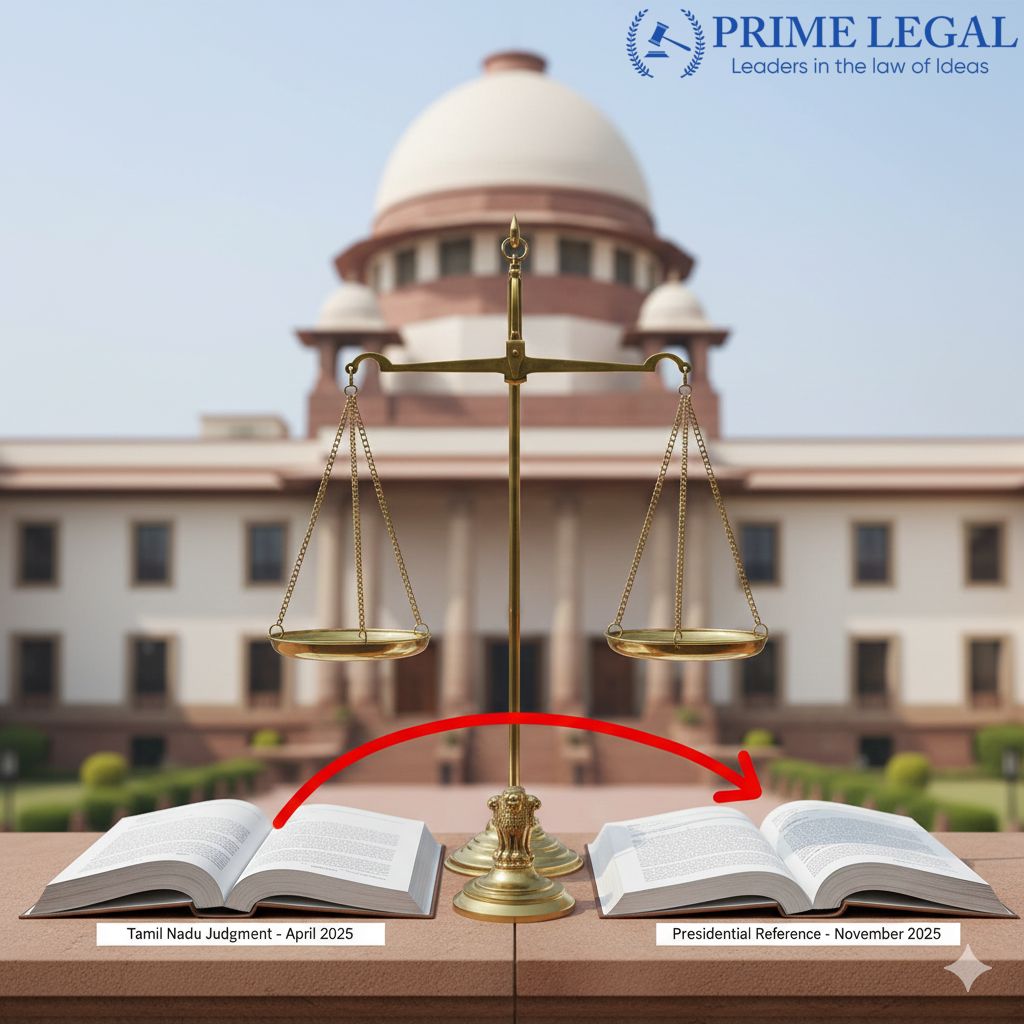INTRODUCTION
On 20th November, 2025 a five judge Constitution Bench of the Supreme Court of India delivered an advisory opinion on the scope of powers enjoyed by state Governors and the President under Article 200 and 201 of the Constitution of India, respectively. The verdict of the Apex Court clarifies the critical constitutional questions about assent, reservations, withholding of bills by Governors/President, discretion, justifiability and the role of judicial review.
BACKGROUND
The advisory opinion was triggered in the wake of 2025 decision in the State of Tamil Nadu v. Governor of Tamil Nadu in which the Court had imposed deadlines on the Governor and President to act on the state-legislated bills, further taking reference of Article 142 of the Constitution of India, it had “deemed assent” to multiple pending bills and declared the action of the Governor and President justiciable.
Soon after that judgement, the President invoked the Court’s advisory jurisdiction under Article 143 of the Constitution of India, by way of “functional reference” posing fourteen questions about the constitutional powers, limits and judicial review of gubernatorial and presidential action on the bill.
Opponents including several States argued that the reference was in effect an attempt to overturn the Tamil Nadu judgement. They contended that the Presidential reference cannot operate as an appeal nor can it overrule a prior judicial decision simply by asking for the Court’s opinion.
KEY POINTS
The bench upheld the admissibility of the Reference, recognizing its functional reference character. The Court observed that the earlier Presidential References have arisen in situations of significant constitutional uncertainty given the divergence of earlier larger bench precedents by Tamil Nadu Governor decision, there was a constitutional imperative to provide authoritative guidance. The bench clarified that an advisory opinion if necessary overrules prior conclusions. Though the instant opinion does not formally vacate the 2025 Tamil Nadu Governor judgement.
The Court held, that a Governor when presented with a bill, fundamentally has three constitutionally permissible options: grant assent, reserve the bill for president’s consideration or withhold assent and return the bill to the legislature for reconsideration. The bench rejected the notion that the Governor can simply withhold assent indefinitely without returning the bill.
The opinion reaffirmed that the governor enjoys genuine discretion under Article 200. The view that a Governor must act only on the aid-and-advice of the Council of Ministers as argued by some was rejected. The Court held that treating the Governor (or President) as a mere “rubber stamp” oversimplifies the constitutional scheme.
The Court held that the earlier imposition of strict timelines on assent based on interpreting “as soon as” based on Article 200 was incorrect. There is no constitutional provision dictating a fixed timeframe; the only temporal requirement is that if the bill is withheld and returned it should be returned “as soon as possible”. Consequently, the concept of “deemed assent” is unconstitutional. Use of Article 142, for deeming assent was disapproved as an improper substitution of constitutional process.
The bench ruled that the exercise of discretion by the Governor or the President under Article 200 and 201 is not subjected to judicial review on merits. Judicial scrutiny is permissible only in limited situations only when there is prolonged, unexplained or indefinite inaction that frustrates the legislative process. In such cases courts may issue directions compelling the Governor to act but cannot substitute their own view on whether assent should have been granted or not. Importantly, Article 361 does not bar such limited review.
The Court held that the same principle applies to mutatis mutandis when bills are reserved for the President under Article 201. The President is not bound by any timeline and cannot be compelled by any judicial review, unless there is an instance of prolonged unexplained inaction. The Court also clarified that a Presidential Reference under Article 143 is not required every time a bill is reserved; it may be used only when the President independently considers it necessary.
RECENT DEVELOPMENTS
The advisory opinion resolves long standing constitutional confusion spawned by the Tamil Nadu Governor of 2025. By reversing key aspects of that judgement particularly timelines and deemed assent, the Court has reasserted the constitutional role of Governors and Presidents with genuine discretion and shielded their actions from judicial review. By allowing limited judicial intervention in cases of the unexplained inaction, the Court has retained a narrow but critical safeguard against potential misuse of discretion.
CONCLUSION
The 2025, advisory opinion in Presidential Reference on powers of the Governor and President marks a significant recalibration on the constitutional dynamics, between state legislature, Governor, the President and the judiciary. It also states that Governors possess real and not ceremonial discretion under Article 200 and 201, and rejects judicially imposed timelines and the concept of “deemed assent” thereby preserving constitutional architecture of federal balance and separation of powers. At the same time, by permitting limited judicial review where lawmakers are left in limbo by indefinite executive inaction, it preserves a narrow backstop to prevent abuse. For legislatures and state governments, the verdict restores some uncertainty on how long a bill may lie pending, while offering a modest check against potential executive stalling.
“PRIME LEGAL is a full-service law firm that has won a National Award and has more than 20 years of experience in an array of sectors and practice areas. Prime legal falls into the category of best law firm, best lawyer, best family lawyer, best divorce lawyer, best divorce law firm, best criminal lawyer, best criminal law firm, best consumer lawyer, best civil lawyer.”
WRITTEN BY- SOUMITA CHAKRABORTY


